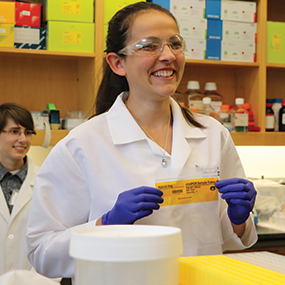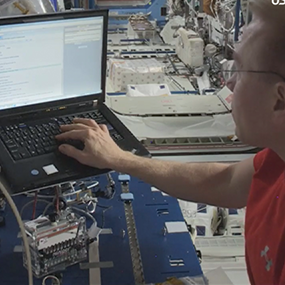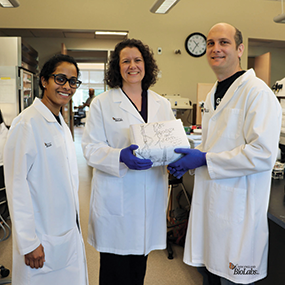First successful PCR experiment performed in space
Genes in Space competition's winning experiment conducted aboard the International Space Station and analyzed at New England Biolabs
by Nicole Nichols, Ph.D., New England Biolabs, Inc.
On April 19, 2016, the first PCRs in space were conducted onboard the International Space Station (ISS). The reactions were designed by New York high school student Anna-Sophia Boguraev, and contained a modified Q5® master mix developed to specifically amplify bisulfite-treated DNA, a critical part of Boguraev’s winning Genes In Space (GIS) proposal to study epigenetic changes in DNA during spaceflight.
Enabling these experiments is a thermocycler called miniPCR™, a Kickstarter-funded instrument from co-founders Sebastian Kraves and Ezequiel Alvarez-Saavedra. The miniPCR is portable and can be controlled by a laptop or cell phone, making it perfect for teaching labs, field work, and now, the ISS.
GIS, a contest conceived of by Boeing and Amplyus and supported by Math for America, the Center for the Advancement of Science in Space (CASIS), FedEx and New England Biolabs, aims to support young innovators in bridging the physical and biological sciences. Boguraev’s 2015 winning entry built upon previous work identifying immune system alterations during spaceflight. She proposed a study to examine epigenetic changes as a possible underlying cause of these alterations and worked with the Giraldez lab at Yale University to design a proof-of-concept test system using bisulfite-treated zebrafish DNA that could be completed on the ISS. Control reactions (which included either the modified Q5 or Taq DNA polymerases, a pUC-based plasmid, and DNA primers in a variety of reaction volumes) were also designed and sent up to the ISS. These reactions were designed not only to help troubleshoot Boguraev’s test reactions, but also to empirically determine microgravity-related technicalities like the amount of liquid that would stay at the bottom of a typical PCR strip tube (to remain in contact with the heating element of the thermocycler).
The reactions and miniPCR machine were launched into space aboard the SpaceX CRS-8 Dragon Resupply Mission on April 8th from the Kennedy Space Center in Cape Canaveral, FL with Boguraev, her family and members of the miniPCR, Boeing, and NEB teams in attendance.
About 4 weeks later, the completed reactions were sent back to earth and brought to NEB for analysis. Anna-Sophia (shown, top right) along with members of her family and many of the teams that supported GIS were all on hand to learn whether the reactions had worked or not. Happily, the control samples and Anna-Sophia’s test reactions all worked well – they now represent the first successful PCRs in space! As for the miniPCR, it will stay behind to enable future experiments, including those designed by the next GIS winning team, who will be chosen at the ISS R&D conference in San Diego, CA this July.
More than 30 years after it’s invention by Kary Mullis of the Cetus Corporation, it’s difficult to find a molecular biologist that hasn’t performed a PCR. And now, thanks to the Genes In Space contest, it may soon be difficult to find an astronaut who hasn’t run a PCR, either.
To learn more about the competition, visit http://www.genesinspace.org




